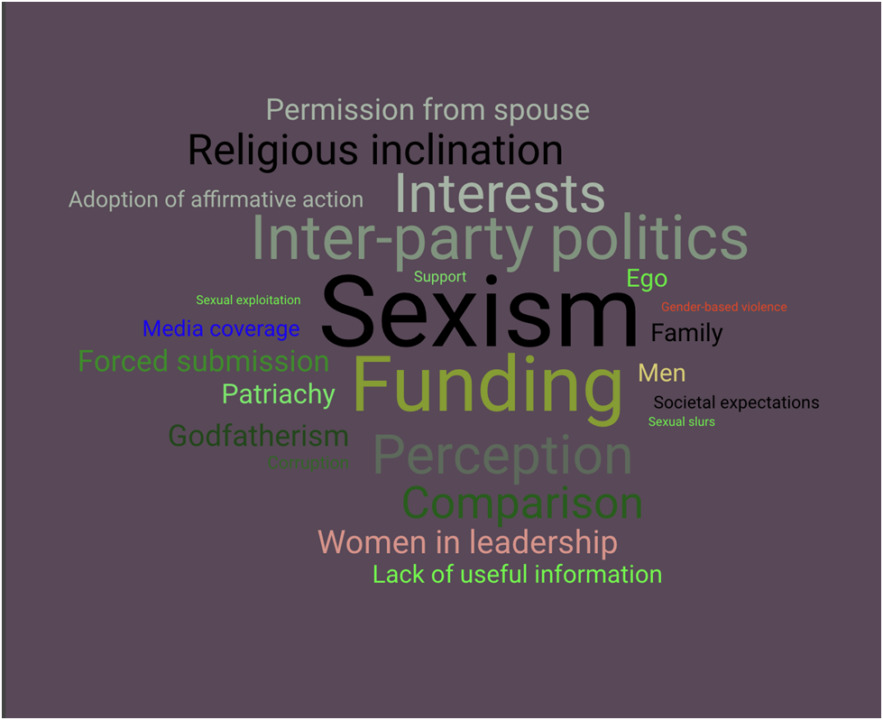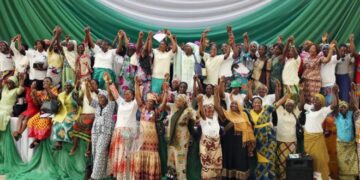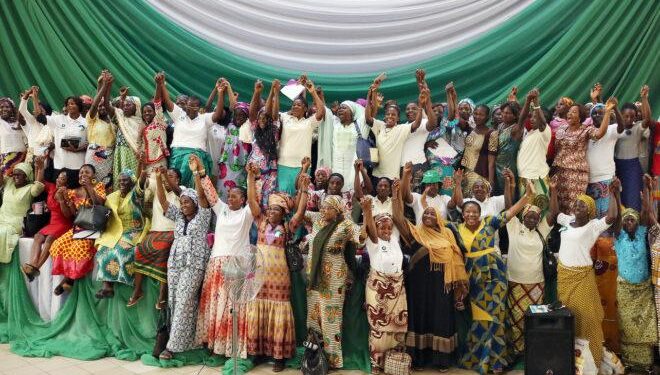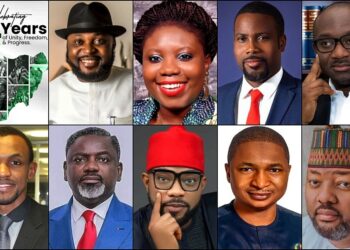By Chioma Iruke

At the beginning of the election year, Princess Chichi Ojei of the Allied Peoples Movement (APM) was the only female presidential candidate in the 2023 general elections. However, less than 10 days before the presidential elections, her party withdrew support for her.
According to the party, the decision was made after evaluating the democratic credentials of Atiku Abubakar, the candidate of the Peoples Democratic Party (PDP) and considered it appropriate in the national interest to adopt him for president in the forthcoming election.
Ojei like other women has had their dreams dashed before their very eyes.
Nigeria’s female population amounted to approximately 106 million in 2021 out of 213 million people. Despite this large number, women have less representation in governance.
At the top four positions in Nigerian governance, only one woman ever occupied any of the seats – a five-month stint as speaker in 2007. As of 2022, only five per cent of Nigeria’s federal lawmakers were women, one of the lowest representation rates globally.
Furthermore, no woman has ever been elected governor.
Since the return of civilian rule in 1999, the participation of women in politics has continued to decline despite various efforts by non-governmental organisations (NGOs) and civil society organisations (CSO).
The results of the just concluded 2023 elections haven’t proven any better with little or no results in some quarters.
For state houses of assemblies, women have only 4.7 per cent representation. Out of the 1,019 females who contested, only 48 were elected.
Though the number of representations increased by 3, it is only a one per cent increase which is a far cry from what is desired.
378 women ran for various seats in the incoming 10th Assembly, but only 17 were successful for both chambers.
European Union (EU) in its 2023 report, described the representation of women as the lowest in the National Assembly since Nigeria’s return to democracy in 1999.
Live Infograph of Women Representation in Parliament
The challenges faced by women in the Nigerian political ecosystem range from funding, sexual harassment, male monopoly and even societal and religious perception.
CDD in this report highlights these issues.

Issues of Sexism, Ageism and Societal Perception
Although sexism happens to both genders, it is more prevalent against women, especially in Nigeria.
Often regarded as a man’s game, women in politics are often very disadvantaged due to sexism.
Banke Ilori-Oyeniyi of the KOWA party while speaking on the roles ‘sexism and ageism’ play in sidelining women, noted that questions bordering on “marital status”, and “depth of knowledge” were part of the questions that were asked whenever a woman decided to vie for any political position. As such, women work twice as hard for a position than their male counterparts due to the “patriarchal nature of the country”.
Citing examples from her experiences, Nafisa Atiku a member of the PDP and Founder of Girls Just Want to Run (GJWR), a non-governmental organisation, explained how sexism and societal perception affect how women act and even how they appear.
“I once wore a corporate dress below my knees to the secretariat and an elderly man tapped me and told me not to wear this type of dress again because I was drawing male attention to myself. Let me just say this, many times when abuse of sexism plays out it does so in the presence of other men and elders who say nothing because of societal background.
“I wasn’t in boyshorts to the secretariat and I think a woman can wear that after all it’s her body. But then I was still told I was indecent.
“When I sometimes speak on gender inequality I get tons of backlash even on social media. A man once came to my DM to tell abuse me of anti-Islamism. According to him, what I was saying was against Islam being a Muslim woman.
“I speak with many younger people and women who make similar complaints. I can’t wear corporate dresses and most time, I have to wear Ankara. It’s not like I love Ankara so much but just to blend into the society that has been created.”
she added, “So you see a narrative that says if you are not married as a female politician, you can never get married and if you are married, you need to take permission from your husband.”
Sexual Exploitation/Violence
Sexual exploitation and violence against women is not a new phenomenon, however, the urge to avoid being a victim of this hideous crime often leads women to be reserved or out of the limelight.
Olabisi Olaleye a former member of the PDP explains that she has over time had to deal with sexual exploitation very early in her political career.
Olaleye who while at the University of Jos was the vice president of the Department of Biochemistry and a member, of the House of Parliament in her 200 and 300 levels respectively, explains that even while at the university there were people who tried to exploit female candidates by asking for sex as a reward for sponsorship or some sort of advantage.
“I have seen this first-hand in my experience and that of a mentor. My mentor who is contesting at the Local level was told by the local chairman that he ‘wanted to taste her’.”
She further asserts that this practice would not cease in the future. “I think years from now we will still experience this. I think it might grow worst.”
Dr loveth Izekor, Director General of Youing Ladies in Politics (YLP), pointed out that sexual exploitation and violence were part of the vices that discourage women from being involved in politics.
“With the trend of women being sexually assaulted make young girls avoid politics. When they hear stories from other women who have been victims, they become discouraged. When they hear stories from those who stood firm to their principles and still failed, they get discouraged. It’s a tricky situation.”
The YLP director further pointed out that some women are enablers of this practice. “When you see women in positions that they are not qualified for, they indirectly tell other women that this is the only way to get it.”
Citing the example of former PDP Kogi governorship candidate, Natasha Akpoti, Ilori-Oyeniyi stressed that the dynamics of violence against women have advanced over time with physical assaults being perpetuated by political opponents.
She nonetheless suggested that the crime continues to be perpetrated because of lack of prosecution.
“Those who have been arrested haven’t been prosecuted and I guess that’s a problem with Nigeria as a whole and though candidates have been accused nothing has been done,” she added.
Interparty politics and funding
Atiku questioned the notion that the only position available for women within the party was ‘Women’s leader’.
She said, “Women are not top of mind amongst party chieftains and I think it’s deliberate. Within the party, women are sidelined because of the way the party is structured. And many times it’s a result of selfish interest. Why would one think that the only position befitting of a woman in political parties is women’s leader? And it gets worse even for younger women. There are Stereotypes and societal inclinations.”
Ilori-Oyeniyi however insisted that people tend to act a certain way not because they are bad but because of already programmed societal norms.
“There are good people in Politics. I have met the good and bad in different parties.
“I think it’s important to note that privileged people tend to hold on to that privilege and sometimes it’s selfish. Some do this intentionally and others don’t.”
Alfa Mohammed, spokesperson of the Social Democratic Party (SDP), inferred that many women were not willing to put in the work and as a result, were not often considered when it came to inter-party appointments.
“The truth is that many women are not interested in politics, especially the young ones. They feel that politics is dirty so they don’t want to get involved. Unfortunately, once the party succeeds, they pick those who were really involved.
“In politics, we don’t beg people to occupy political positions because there are many people vying for the same position. Women hardly come forward to occupy these positions even when we zone it to regions or states. So what do we do, we use those available. We cannot say because you are a woman you should take the job.”
Misconceptions about Women in larger parties in contrast to those from smaller parties
Both Ilori and Atiku were of the opinion that women in smaller political parties have the chance of growing together with the party and occupying more relevant positions than those of smaller parties.
“I was National Publicity Secretary before I was 27 years, the youngest so far. Smaller parties give you an opportunity to learn. I would not have had the leadership opportunity I have, had I been in a bigger party, I don’t have parents that are political chieftains. I encourage young people to do the hard work and build from scratch.
“Today we have a third force and it is because you have to change the shape of things for larger parties. It would take time but it’s worth it,” Ilori said.
“A couple of years ago I was part of a smaller party and I think it was easier there than it is now.
In the bigger parties, selfish interest plays a big role in how women are elected. In smaller parties, the issue of self-interest was there but it wasn’t above the central objective,” Atiku reaffirms.
Changing the narratives
Arome Salifu, the director of the Africa Youth Growth Foundation (AYGF), explained that for women to change the narratives they needed to build capacity, and character and have the necessary requirements to succeed in the political space.
He further asserted that opposition thrives when the required capacity needed in the position aspired for is not available. He however encouraged more women to research the needs of the position they aspire for before venturing.
Olabisi was positive that the narrative of women unable to attain certain heights is beginning to change, adding that there would be more representation of women in the future.
Mohammed was of the opinion that more women needed to be encouraged to be part of politics.
“We try to encourage women to take part in politics by ensuring that political position tickets are slashed and political forms are free.
“I think NGOs should also encourage women to be part of politics and do a lot of orientation because, to be honest, many men do not even encourage their wives to be part of politics.”
Atiku despite acknowledging the improvement in women’s participation suggested stronger legislation in the adoption of the 35% affirmative action.
She suggested that women begin taking part in politics even at the grassroots level, even as she called for political orientation embedded in civic education, especially in secondary schools.
This story is part of the AWiM/Luminate Young Women in Politics Programme.




































